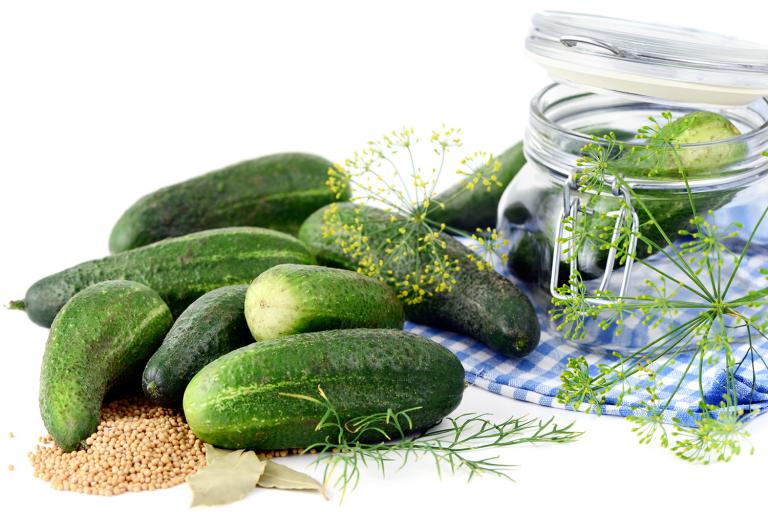LOCATIONS
Kosher Dill Pickles

Yield
Makes about 5 quart jars
Recipe Source
Canning for a New Generation by Liana Krissoff ($27.50, Stewart, Tabori, & Chang, 2016)
Ingredients
- 1⁄2 cup pickling spice
- 1 bunch fresh dill
- Several handfuls of fresh, untreated grape (or scuppernong) or black currant leaves (optional)
- 7 lbs pickling cucumbers (no longer than 4 inches, if possible, for easy packing)
- 4 cloves garlic, peeled but left whole
- 1 cup cider vinegar (5% acidity; optional)
- 3⁄4 cup pure kosher salt
Directions
Fermentation Method for Pickles
- Cut off the blossom end of each cucumber. If you can’t tell which end that is, cut off both ends. Put half of the spices in the bottom of a clean 2 to 3 gallon crock or glass jar.
- Add half of the dill and half of the grape leaves, if using, then add the cucumbers, filling the jar no more than two thirds full. Top with the remaining spices, dill, and grape leaves and drop in the garlic.
- In a large bowl, combine the vinegar, salt, and 1 gallon cold water. Pour over the cucumbers to just cover them (you may not use all of the liquid).
- Set a small plate on top of the cucumbers and place a weight on top to keep them submerged in the brine (a quart-size freezer bag filled with water or extra brine works well). Cover loosely and set aside in a cool spot in the house for 2 to 3 weeks, until the pickles are no longer white in the center when cut.
- After about 2 days, the mixture should start to ferment and bubble; skim the foam from the surface once every day or two.
Water Bath Canning Method for Pickles
- Prepare for water-bath canning: Wash the jars and keep them hot in the canning pot, and put the flat lids in a heatproof bowl. Put a fine-mesh sieve over a large nonreactive pot and ladle in as much of the brine as you can.
- Bring to a simmer. Ladle boiling water from the canning pot into the bowl with the lids. Using a jar lifter, remove the hot jars from the canning pot, carefully pouring the water from each one back into the pot, and place them upright on a folded towel. Drain the water off the jar lids.
- Working quickly, pack the pickles in the jars as snugly as you can without damaging them. Put a garlic clove and some of the dill in each jar, along with a grape leaf, if desired.
- Ladle in the hot brine, leaving 1⁄2 inch headspace at the top. Use a chopstick to remove the air bubbles around the inside of each jar. Use a damp paper towel to wipe the rims of the jars, then put a flat lid and ring on each jar, adjusting the ring so that it’s just finger-tight.
- Return the jars to the water in the canning pot, making sure the water covers the jars by at least 1 inch. If pasteurizing, bring the water in the pot to 180°F, and keep it there, adjusting the burner as necessary, for 30 minutes. (Any time the water spends below 180°F must be added to the pasteurizing time so that the water is at 180°F for a total of 30 minutes.)
- If processing, bring to a full boil, and boil for 10 minutes. Remove the jars to a folded towel and do not disturb for 12 hours. After 1 hour, check that the lids have sealed by pressing down on the center of each; if it can be pushed down, it has not sealed, and the jar should be refrigerated immediately. Label the sealed jars and store.
